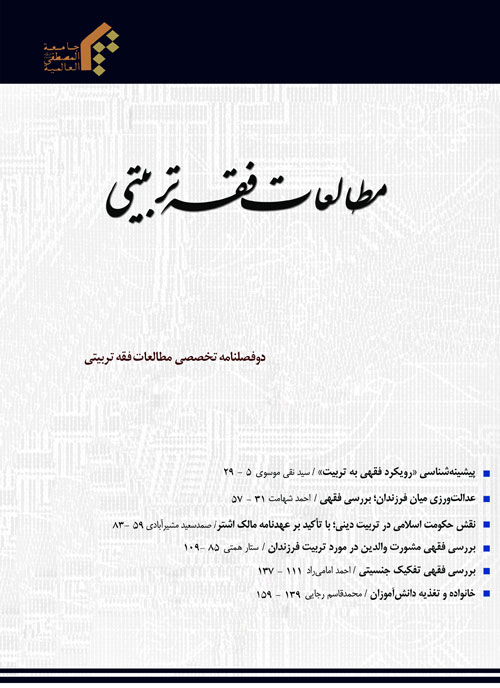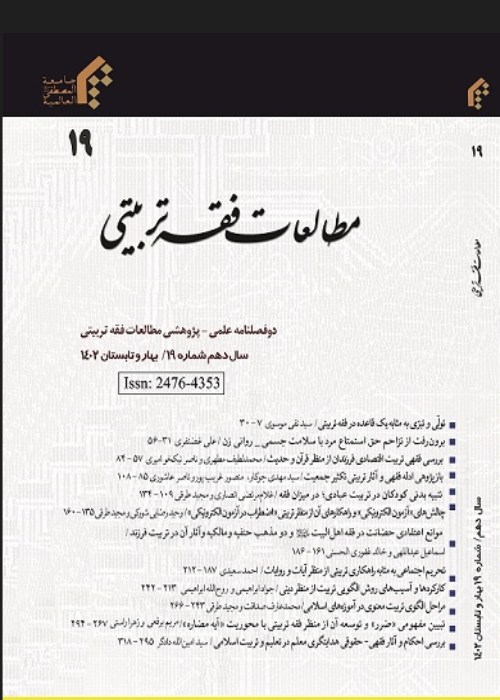فهرست مطالب

مجله مطالعات فقه تربیتی
سال سوم شماره 5 (بهار و تابستان 1395)
- تاریخ انتشار: 1395/06/28
- تعداد عناوین: 5
-
-
صفحات 7-30«فقه تربیتی» و احکام تربیتی استنباط شده در آن، می تواند موضوع تحلیل های فلسفی و فرافقهی قرار گیرد. نوشتار حاضر درصدد است تا دلالت یابی پسینی از فتاوا و احکام فقه تربیتی را بررسی نماید و استلزامات، اقتضاها و دلالت های آشکار و نهان این احکام را با روش تحقیق نظری و فلسفی، گونه شناسی کند. نوشتار حاضر، سه گونه دلالت شناسی از گزاره های فقه تربیتی را شناسایی و تبیین نموده است که عبارت اند از: دلالت شناسی در قلمرو ملاکات احکام، دلالت شناسی در قلمرو امتثال تکالیف تربیتی و رویکردشناسی. نوشتار پیش رو تلاش می کند با تبیین و تشریح این سه و ذکر مثال هایی برای آن، به اعتبارسنجی منطقی و فلسفی این دلالت ها و نیز سنجش وجه اسلامیت و شرعیت این دلالت ها اقدام نماید.کلیدواژگان: فلسفه فقه تربیتی، تربیت اسلامی، دلالت التزامی، دلالت عقلی
-
صفحات 31-56قرآن و روایات مهم ترین منابع معرفتی دین اسلام اند. در عصر ائمه^ و در نظام آموزشی اسلامی تا قبل از دوران فراگیری آموزش و پرورش رسمی، آموزش دادن قرآن و حدیث در جامعه اسلامی در بین سایر علوم اولویت داشته است. متاسفانه در دوران معاصر، برنامه آموزش رسمی، بدون توجه به اولویت های برنامه درسی منطبق با مبانی نظری تربیتی اسلام طراحی شد. نتیجه این بی مهری محجوریت عملی روایات معصومان^ در جامعه اسلامی ایران بوده است. کوشش برای اسلامی سازی مدارس، نیازمند تبیین مبانی نظری تعلیم علوم اسلامی از جمله علوم حدیث است. در این مقاله با استفاده از روش اجتهاد جواهری، نخست، مفهوم تعلیم حدیث و ضرورت آن در بخش کلیات بررسی گردیده، سپس ادله مورد استناد در دو گروه ادله عام و ادله خاص مورد مداقه قرار گرفته است. در نتیجه گیری اشاره شده است که تعلیم حدیث به عنوان اولی، مستحب موکد و دارای اولویت در تدریس است اما ممکن است حکم تعلیم حدیث در نتیجه عروض عناوین ثانویه به دیگر احکام خمسه تغییر یابد.کلیدواژگان: حدیث، روایت، تعلیم، تعلیم حدیث، حکم تعلیم حدیث
-
صفحات 57-82در اسلام تعلیم و تعلم مورد تاکید فراوان است و در روایات اسلامی جهل و خرافات نکوهش شده و طلب علم بر هر مرد و زن مسلمان فریضه است. دسته ای از علوم و دانش ها، سحر و علوم و فنون غریبه است که در عین پیچیدگی و آسیب زایی برخی به تعلیم و تعلم آن می پردازند. این مسئله از زوایای مختلف از جمله از منظر فقهی قابل بررسی است. اکنون سوال این است: آیا اصل ترغیب اسلام به تعلیم و تعلم مشمول تمام علوم از جمله سحر می شود؟ یا اینکه سحر ذیل آن قاعده کلی نیست؟ در مقاله حاضر، با استناد به ادله متعارف فقهی پاسخ سوال ارائه می شود. برخی مطلق تعلیم و تعلم سحر را حرام شمرده و برخی جواز آن را با شرایطی پذیرفته اند. لذا حکم اولی تعلیم و تعلم سحر حرمت است، مگر سحر در مقام دفاع و ابطال؛ بالتبع تعلیم و تعلم آن نیز نمی تواند به طور مطلق حرام باشد. در صورت اثبات حرمت فقهی تعلیم و تعلم سحر با قیود خاص، توسعه محتوای آن علم و فن بدون ملاحظه محدوده مجاز شرعی، ممنوع و موجب فساد است، این امر می تواند تکلیف آگاهان و جویندگان سحر را روشن سازد و متصدیان تعلیم و تربیت را برای پیشگیری از انحراف مسیر طبیعی تعلیم و تربیت یاری کند.کلیدواژگان: تعلیم، تعلم، سحر، علوم غریبه
-
صفحات 83-108تربیت جنسی یکی از ساحت های مهم تربیتی است و در متون دینی روش های خاصی را به خود اختصاص داده است. اهمیت ندادن به پیشگیری های لازم در این حیطه و مبتلا شدن متربی به شهوات نامشروع، آفات فراوانی را متوجه او می کند و درمان آن را با مشکلات بسیاری مواجه می سازد. از این رو، روش های پیشگیرانه در این ساحت اهمیت بسیار دارد. از جمله این روش ها که در این حیطه می تواند مورد توجه باشد، «جداسازی بستر کودکان» است. وجوب یا رجحان این امر از منظر فقهی و همچنین مکلفان به آن از سوالاتی است که پژوهش حاضر بدان پاسخ داده است. سوالات فرعی فقهی از جمله مقصود از «مضجع» (بستر)، دخالت یا عدم دخالت جنسیت یا محرم بودن کودکان در این امر، انتهای حکم از لحاظ سنی، ابتدایی یا استمراری بودن تکلیف و سوالاتی از این قبیل، یازده فرع را به خود اختصاص می دهد.کلیدواژگان: تربیت، جنسی، تفریق مضاجع، جنسیت، بستر
-
صفحات 135-162از اصول مورد تاکید در اسلام، اهتمام به امر تعلیم و تعلم است که مبتنی بر عناصر گوناگون از جمله نقش معلم و فراگیر و نیز محتوای آموزشی است. از جمله محتواهای آموزشی، محتواهای ضاله و باطل است. مسئله حرمت حفظ کتب ضاله در فقه شیعه و در خلال مباحث مکاسب محرمه بررسی شده است. بر همین اساس به تناسب محتوا، تعلیم و تعلم مشمول احکام خمسه می شود. البته علی رغم توجه قرآن و سنت نبوی و ائمه^ به این مسئله، برخی زوایا و مسائل پیرامون آن از جمله حکم تعلیم و تعلم محتوای ضاله به طور مبسوط مورد توجه فقها قرار نگرفته است. تعلیم و تعلم محتوای ضاله راه را برای ترویج و نشر آن فراهم می نماید، لذا یکی از مسائل حائز اهمیت بررسی حکم فقهی تعلیم و تعلم محتوای ضاله است. بر این اساس، در این مقاله تلاش شده تا با برجسته ساختن عنوان محل بحث، حکم تعلیم و تعلم محتوای ضاله از منظر فقهی بررسی شود، تا حدود وظایف فقهی معلم و متعلم در این باره روشن شود. برای پاسخ به این سوال به شیوه فقها، ادله متعارف فقهی بررسی می شود. حکم اولی تعلیم و تعلم محتوای باطل، حرمت است که در شرایطی حرمت آن برداشته می شود و فراتر از آن ممکن است برای برخی افراد واجب باشد.کلیدواژگان: تعلیم، تعلم، محتوا، ضاله، باطل
-
Pages 31-56The Quran and tradition are the most important sources of knowledge in Islam. In the period of the infallible (AS) and in the Islamic education system until before the period of formal education, preference and priority was given to teaching Quran and hadith. Unfortunately, in the present age, formal education has been laid out and designed with complete disregard for educational preferences and educational theoretical principles of Islam as a consequence of which the sayings and traditions of the infallible imams have been practically neglected. Any efforts to Islamize the schools would require the theoretical principles for teaching Islamic sciences including hadith sciences to be explained. In this article, first with reliance on the deduction method characteristic of Jawaher al-Kalam the concept and need for teaching hadith have been explained in the generalities section. Thereupon, the corroborating reasons and arguments have been scrutinized. It has been concluded at the end that teaching hadith is highly recommended per se and that priority should be given to it regardless of the circumstances but it is likely that the Islamic law about teaching hadith may change into one of the five legal values or qualifications.Keywords: hadith, narration, teaching, hadith, Islamic law on teaching hadith
-
Pages 57-82Teaching and learning have been highly emphasized by Islam while ignorance and superstition have been strongly condemned. Seeking knowledge is a duty of every Muslim man and Muslim woman. Some forms of knowledge include magic and occult sciences and arts which some people learn despite them being complex and having negative influences. This issue can be studied from different angles and from the perspectives of various sciences including jurisprudence. The focal question is: Does the Islamic recommendation about seeking knowledge also include magic? Or is it that knowledge of magic is not included in the category of sciences? This article seeks to address this question from the perspectives of different scholars. Some are of the view that teaching and learning magic are forbidden under all circumstances, others are of the view that they are allowed under specific conditions. Thus, the principal ruling about magic is that it is forbidden to teach and learn magic except in cases when one embarks on terminating a magic spell or defending himself against. It would not be, by extension, forbidden in an absolute sense.
If magic is proved to be forbidden, it would be forbidden to spread and promote it because not only it will be disregard to Shariah but it will cause evil to be disseminated.Keywords: teaching, learning, magic, the occult sciences (al, ulum al gharibah) -
Pages 83-108Sexual ethics is one of the most important aspects of education and upbringing (tarbiyah) with special methods allotted to it in religious texts. Not giving importance to necessary preventions can entail grave consequences for the trainee because he will be afflicted with illicit lust. Such problems are then difficult to cure. Thus, prevention methods are of immense importance in this regard. Among those methods that can be taken into consideration is to separate a childs bedroom. The necessity or desirability of doing this is among the questions that the present research aims to investigate. The different aspects of this topic such as the concept of bed, gender, blood relation, continuity or discontinuity of obligation and questions of this nature are among the eleven subtitles discussed in this article.Keywords: education, sexual, separating beds, sexuality, bed
-
Pages 135-162Education is among the principles highly emphasized by Islam and which different elements of teaching and learning are squarely based upon. The role of teacher and trainee as well as the educational contents are among those elements that need due attention. Among the educational contents are the false, deviating and misleading contents. The prohibition of preserving and keeping such books has been discussed in Shiite jurisprudence in the chapters concerning forbidden acquisitions. Thus depending on the nature of the contents of what is taught, teaching and learning are included in the category of the five Islamic rules. Despite the Quran and prophetic tradition addressing this issue, some aspects of the problem including the Islamic law about teaching and learning misleading contents have not been dealt with by scholars at length.
Teaching and learning false and misleading contents help spread those contents. Hence, one of the important issues in this connection is to examine this topic from a jurisprudential perspective. Efforts have been made, in this study, to highlight the main title and to explore and analyze the rules regarding teaching and learning misleading contents. The aim is to throw light on the jurisprudential duty of a teacher and trainee in this regard examining the arguments presented in the jurisprudential sources. The principal and basic rule about teaching and learning misleading contents is that they are prohibited. However, in some circumstances the prohibition is lifted and it may in rare circumstances become obligatory for some people.


